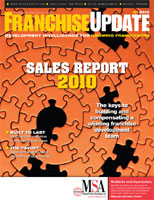Greasing the Skids: How Franchisors can Help Bankers Make Loans in 2010
In 2010 every banker is from Missouri: "Show me" that the franchisee, franchisor, and system are acceptable risks.
Access to capital is the number-one issue facing franchising in 2010. This isn't just an issue for new unit development--it is every bit as much of an issue for transfers. In both situations, franchisors have a large vested interest in ensuring that capital is there when a franchisee needs it.
By now we all know the forces that got us to this point. The question is, What can franchisors do this year to address the issue?
To understand the possibilities, we first must understand what the banking community is doing. They are in a risk reduction mood and will remain so for some time. Bank capital has been eroded with the housing crisis and will be further eroded with commercial real estate losses. Business loans are receiving much greater scrutiny, a situation that will last for some time to come. As many of you have heard me say: When evaluating a business credit departments look in the rearview mirror. Before extending credit they want to see 12 months of profitable performance. That implies we are at least a year away from any loosening of credit standards.
Gone are the days of preferred lender relationships, where one bank provided the majority of financing for one franchise system. Today many banks are needed, and most are smaller, community-based banks not experienced with your brand and often not even experienced with franchise lending.
What franchisors can do
Some franchisors are taking important steps that don't bring their balance sheets into play. For many years, being on the SBA Franchise Registry was a way to demonstrate additional support. Today it is a checklist item for most banks. If you're not listed and current, more than 1,000 other brands are--so it's easy for banks to move on to the next brand. Since banks are cherry-picking (you would too, if you were a bank), more extensive due diligence is the order of the day. Performance matters.
To stand out from the crowd, you must show banks that your franchisee and your brand are above-average credit risks. Your franchisee needs a professional package to present, and if they can't do it on their own get some help from a professional loan broker. In today's lending environment you also need to show bankers that franchisor and system performance are solid. That's why so many franchisors and more banks are asking for bank credit reports.
How much is enough?
While these indirect steps are now essential, they may not be sufficient given your brand's performance, reputation, growth plans, geographic area, industry, and other points that bankers are now assessing. Thus, an active financial support program may prove to be the difference-maker in achieving your growth goals in 2010. For decades some franchisors have provided direct credit support programs with a few common themes.
Bankers have two basic objectives: 1) to get their money back, and 2) to get a reasonable return. In today's weak economy, the first trumps the second. This isn't to say that bankers don't want to make a profit (and many are charging much higher rates when they can), it is merely to say that the risk of not getting their money back is the bigger objective to solve for today.
Bankers address the first objective by more intensive (shall we say painful?) underwriting standards and due diligence. Now let's bring the franchisor's balance sheet into the equation. If a franchisor can assume some of the initial lending risk for a new unit or transfer financing, the lender will be more interested. Most lenders understand (and SBA data supports) that the greatest risk is in the first three years of a new financing. Partial guarantees and pooled guarantee programs that burn off in three to five years are ways to structure such enhancements. Bankers don't want to end up with the keys to businesses from loans that have gone into default. Franchisors can contractually commit to unit and/or equipment remarketing agreements.
Some franchisors have taken the lender out of the equation entirely, underwriting and financing their franchisees themselves. Some have even partnered with franchisees by providing some of the equity capital necessary to attract lenders. Franchisors have approached such programs with professional guidance and with an expectation that the financing department will be a profit center.
Whether to use the franchisor's capital capacity to facilitate new unit and transfer programs is a decision requiring professional advice. A few years ago, when preferred lenders roamed the land, it wasn't much of a topic. Today, it has moved from discussion to practice for a new group of interested franchisors fighting today's growth challenges--just as the franchisors that have been doing it for years were motivated during previous times of capital access challenges.
Darrell Johnson is president and CEO of FRANdata, an independent research company supplying information and analysis for the franchising sector since 1989. He can be reached at 703-740-4700 or [email protected].
Share this Feature
Recommended Reading:
FRANCHISE TOPICS
- Multi-Unit Franchising
- Get Started in Franchising
- Franchise Growth
- Franchise Operations
- Open New Units
- Franchise Leadership
- Franchise Marketing
- Technology
- Franchise Law
- Franchise Awards
- Franchise Rankings
- Franchise Trends
- Franchise Development
- Featured Franchise Stories
FEATURED IN

Franchise Update Magazine: Issue 1, 2010








 The franchise listed above are not related to or endorsed by Franchise Update or Franchise Update Media Group. We are not engaged in, supporting, or endorsing any specific franchise, business opportunity, company or individual. No statement in this site is to be construed as a recommendation. We encourage prospective franchise buyers to perform extensive due diligence when considering a franchise opportunity.
The franchise listed above are not related to or endorsed by Franchise Update or Franchise Update Media Group. We are not engaged in, supporting, or endorsing any specific franchise, business opportunity, company or individual. No statement in this site is to be construed as a recommendation. We encourage prospective franchise buyers to perform extensive due diligence when considering a franchise opportunity.